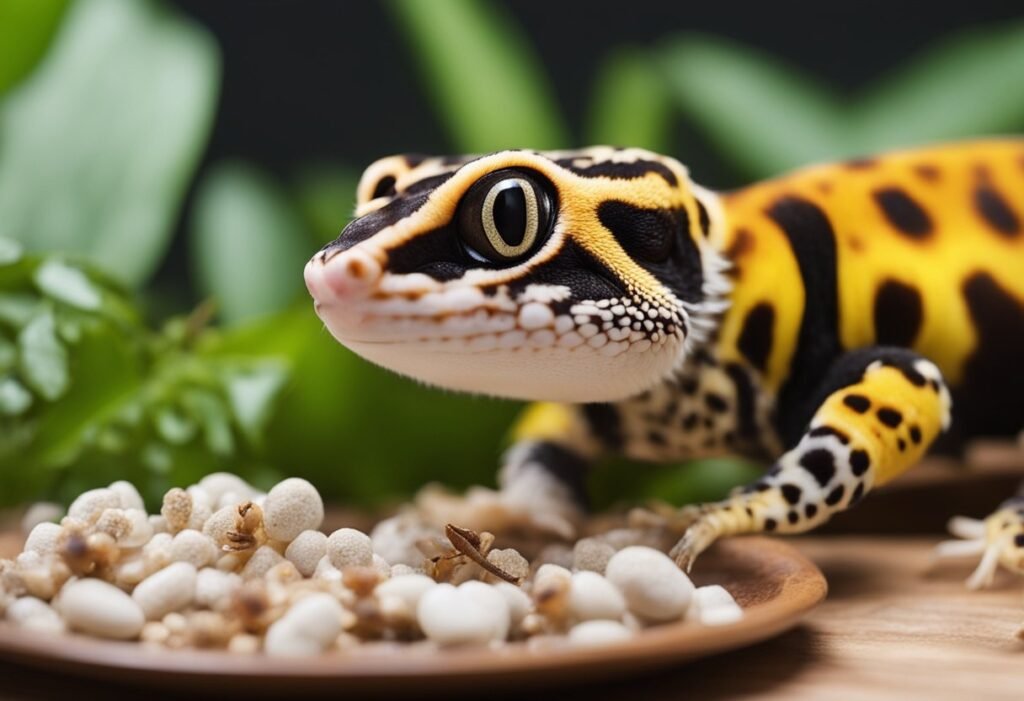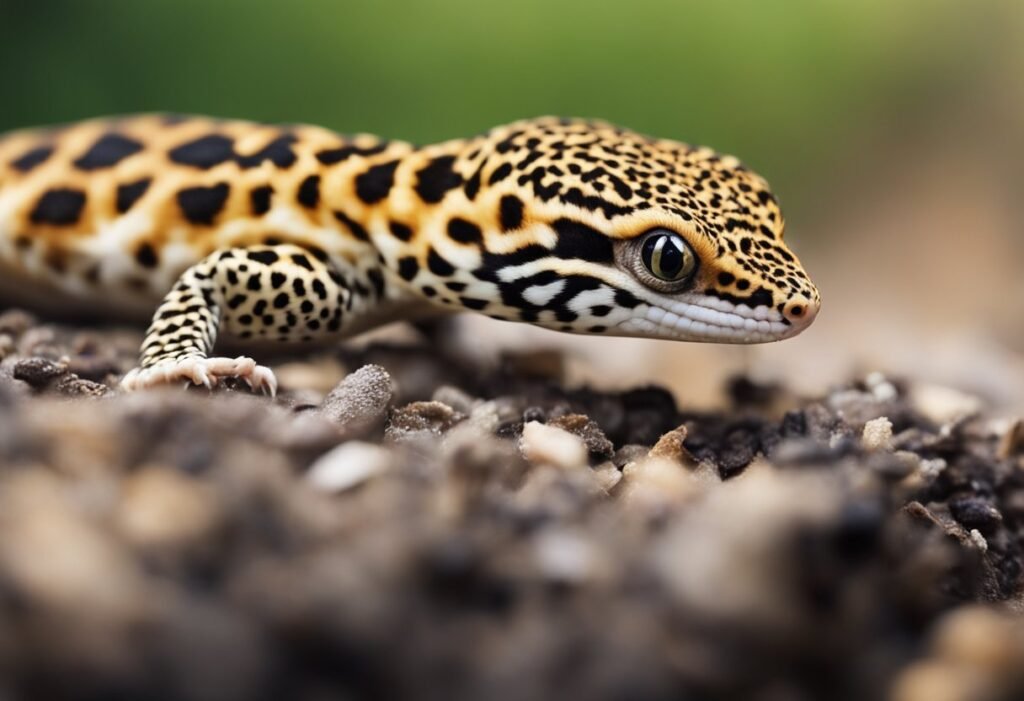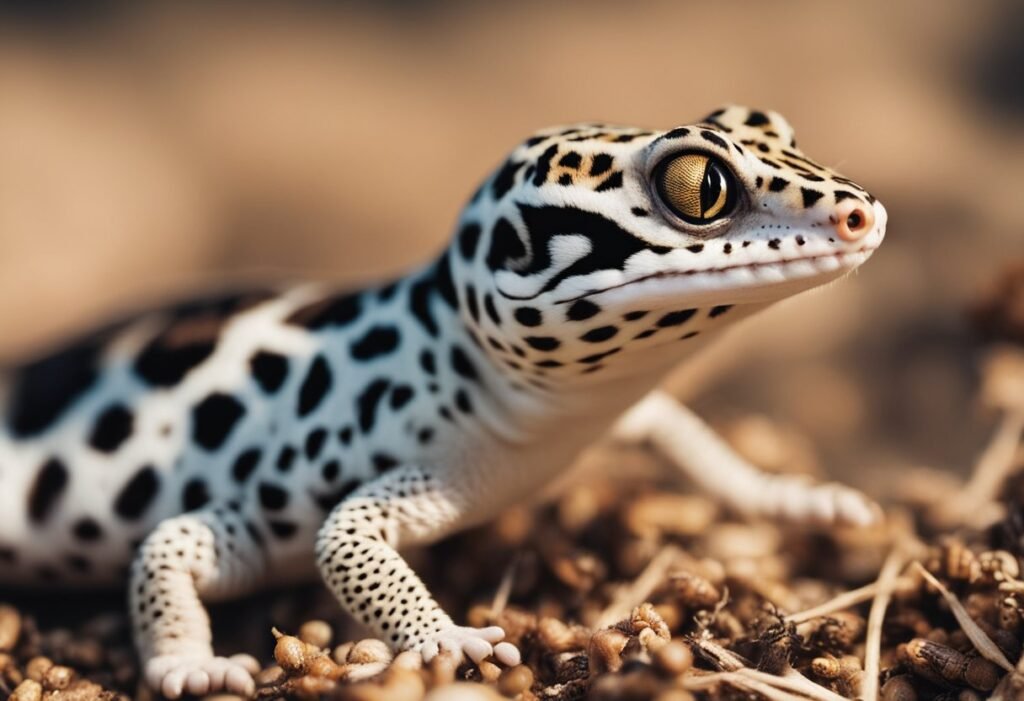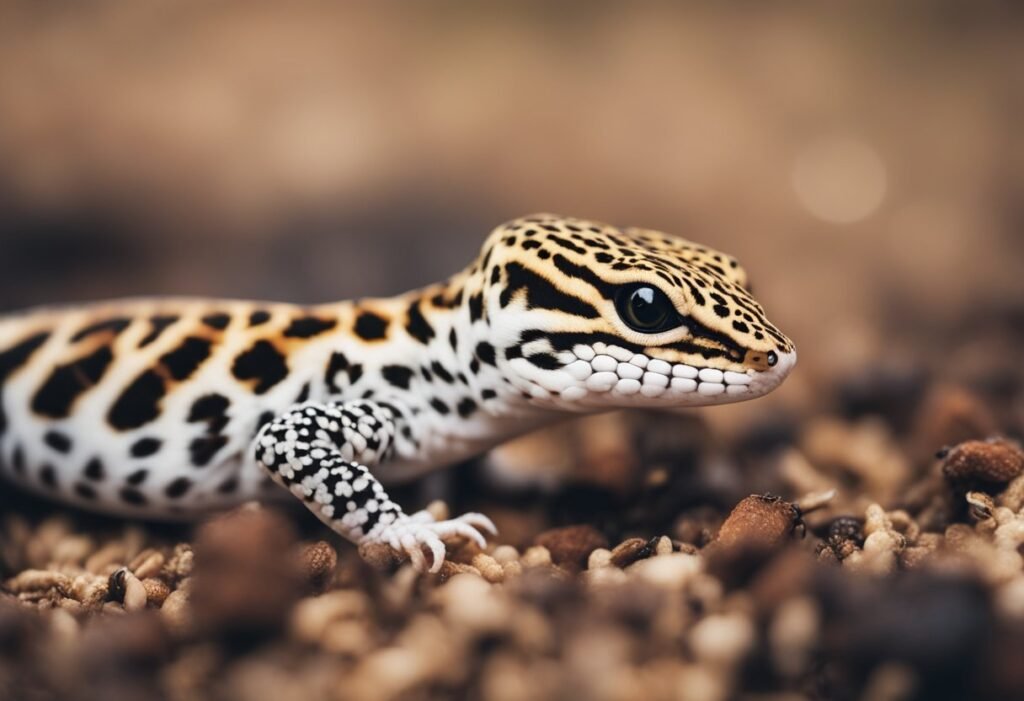Leopard geckos are fascinating creatures that are easy to care for and make great pets. One of the most common questions that new owners ask is whether or not their geckos can eat dead bugs. The short answer is yes, they can, but there are some important things to keep in mind.
Firstly, it’s important to note that leopard geckos are insectivores, which means that they eat insects as their primary source of food. In the wild, they would hunt live insects, but in captivity, they can also eat dead insects. However, it’s important to make sure that the dead bugs are fresh and haven’t been sitting around for too long. This is because dead insects can quickly become contaminated with harmful bacteria, which can make your gecko sick.
Dietary Basics for Leopard Geckos

Leopard geckos are insectivorous, meaning they primarily eat insects. However, it is important to provide them with a balanced diet that meets their nutritional requirements.
Nutritional Requirements
Leopard geckos require a diet that is high in protein and low in fat. They also need a source of calcium and vitamin D3 to maintain healthy bones. Feeding them a variety of insects can help ensure they receive all the necessary nutrients.
Here is a table of some common insects and their nutritional value:
| Insect | Protein (%) | Fat (%) | Calcium (mg/100g) | Phosphorus (mg/100g) |
|---|---|---|---|---|
| Crickets | 21 | 6 | 75 | 220 |
| Mealworms | 20 | 13 | 100 | 240 |
| Waxworms | 15 | 22 | 20 | 270 |
| Dubia Roaches | 23 | 7 | 200 | 210 |
It is important to gut-load the insects before feeding them to your leopard gecko. This means feeding the insects a nutritious diet before offering them to your gecko. This can help ensure your gecko receives the necessary nutrients.
Feeding Frequency and Amount
Leopard geckos should be fed every 2-3 days. The amount of food they require will depend on their age and size. As a general rule, juvenile leopard geckos should be fed more frequently than adults.
Here is a table of recommended feeding amounts based on age and size:
| Age | Size | Amount |
|---|---|---|
| Juvenile | 3-4 inches | 4-6 small insects or 2-3 large insects |
| Sub-adult | 4-5 inches | 6-8 small insects or 3-4 large insects |
| Adult | 6-8 inches | 8-10 small insects or 4-5 large insects |
It is important not to overfeed your leopard gecko as this can lead to obesity and other health problems. Offer only the amount of food they can consume in a 10-15 minute period.
In conclusion, leopard geckos require a balanced diet that meets their nutritional requirements. Feeding them a variety of gut-loaded insects and offering the appropriate amount can help ensure their health and well-being.
Understanding Leopard Gecko Feeding Behavior

Leopard geckos are insectivores, which means they primarily eat insects. In the wild, they consume a variety of live insects, including crickets, mealworms, and waxworms. In captivity, it is essential to provide them with a balanced diet that meets their nutritional needs.
Live Prey Preference
Leopard geckos have a strong preference for live prey. They are instinctively wired to hunt and capture their food. Live prey provides them with the opportunity to exhibit natural feeding behaviors, such as stalking, chasing, and pouncing. This not only satisfies their innate hunting instincts but also provides them with exercise and mental stimulation.
Providing live prey also ensures that the food is fresh and nutritious. Live insects are high in protein and other essential nutrients that leopard geckos require for growth and development. It is important to offer a variety of live insects to ensure a balanced diet.
Response to Dead Insects
While leopard geckos prefer live prey, they can also consume dead insects. However, it is important to note that they may not recognize dead insects as food. Leopard geckos rely heavily on their sense of sight and movement to identify prey. Dead insects do not move, and their colors may fade, making them less attractive to leopard geckos.
If you choose to offer dead insects, it is important to ensure that they are fresh and have not been treated with any chemicals or pesticides. You can also try wiggling the dead insect with tweezers to simulate movement and make it more appealing to your leopard gecko.
In conclusion, while leopard geckos can eat dead insects, live prey is their preferred food source. Providing a variety of live insects ensures that they receive a balanced diet and the opportunity to exhibit natural feeding behaviors. If you choose to offer dead insects, make sure they are fresh and try to simulate movement to make them more attractive to your leopard gecko.
Pros and Cons of Feeding Dead Bugs

When it comes to feeding leopard geckos, there are many options available. One of the options is feeding dead bugs. While this may seem like a convenient and safe option, there are both pros and cons to consider.
Health and Safety Considerations
One of the main benefits of feeding dead bugs is that they are less likely to carry diseases and parasites than live insects. This is because the process of freezing and thawing can kill any potential pathogens. Additionally, since dead bugs are not moving, there is less risk of injury to your gecko from the prey fighting back.
However, it is important to note that feeding dead bugs can also have some drawbacks. Dead insects can quickly become contaminated with bacteria and fungi, which can make your gecko sick if they consume them. It is crucial to ensure that the dead bugs are fresh and properly stored to avoid any health risks.
Convenience and Availability
Another advantage of feeding dead bugs is the convenience factor. They can be purchased in bulk and stored in the freezer until needed. This means that you always have a supply of food on hand, which can be especially helpful if you live in an area where live insects are not readily available.
On the other hand, feeding dead bugs may not provide the same level of enrichment for your gecko as live prey. Hunting and catching live insects can stimulate your gecko’s natural instincts and provide mental and physical stimulation. Additionally, some geckos may not be interested in eating dead bugs, which can lead to a lack of appetite.
Overall, feeding dead bugs can be a safe and convenient option for leopard gecko owners. However, it is important to consider both the health and safety implications, as well as the potential impact on your gecko’s enrichment and appetite.
Preparing Dead Bugs for Feeding
When it comes to feeding leopard geckos, many owners wonder if it’s okay to feed them dead bugs. The answer is yes, but it’s important to properly prepare the bugs before offering them to your gecko.
Proper Storage
First, it’s important to store dead bugs properly to prevent them from going bad. We recommend keeping them in a sealed container in the refrigerator or freezer. This will help to preserve their nutritional value and prevent the growth of harmful bacteria.
Rehydrating Techniques
Dead bugs can be dehydrated, which can make them less appealing to your gecko. To rehydrate them, we recommend placing them in a small dish with a few drops of water. This will help to restore their moisture and make them more appetizing to your gecko.
Another technique is to use a product like Fluker’s Repta-Boost, which is a powdered supplement that can be mixed with water to create a gel-like substance. Simply dip the dead bugs in the mixture and offer them to your gecko.
Overall, feeding your leopard gecko dead bugs can be a convenient and nutritious option, as long as they are properly prepared and stored. By following these tips, you can ensure that your gecko is getting the nutrients they need to stay healthy and happy.
Safe Insect Choices for Leopard Geckos

When it comes to feeding leopard geckos, it is important to choose safe and nutritious insects. While live insects are the preferred choice, dead insects can also be fed to leopard geckos if they are properly stored and prepared.
Commonly Accepted Dead Bugs
Some commonly accepted dead bugs that can be fed to leopard geckos include:
- Mealworms: Mealworms are a popular choice for leopard geckos and can be purchased either live or dead. Dead mealworms should be stored in a cool, dry place and can be offered to leopard geckos as a treat.
- Crickets: Crickets are another popular choice for leopard geckos and can also be purchased either live or dead. Dead crickets should be gut-loaded with nutritious food before being fed to leopard geckos.
- Dubia Roaches: Dubia roaches are a nutritious choice for leopard geckos and can be purchased either live or dead. Dead dubia roaches should be stored in a sealed container in the refrigerator and can be offered to leopard geckos as needed.
Insects to Avoid
While some insects are safe for leopard geckos to eat, there are also some insects that should be avoided. These include:
- Fireflies: Fireflies contain toxins that can be harmful to leopard geckos and should never be fed to them.
- Butterflies and Moths: Butterflies and moths can contain harmful toxins and should not be fed to leopard geckos.
- Ladybugs: Ladybugs can also be toxic to leopard geckos and should be avoided.
In conclusion, when feeding dead insects to leopard geckos, it is important to choose safe and nutritious options and avoid any insects that may be harmful to their health. With proper storage and preparation, dead insects can be a great addition to a leopard gecko’s diet.
Monitoring Your Leopard Gecko’s Health
As responsible pet owners, it is important that we monitor our leopard geckos’ health regularly. One aspect of their health that we need to keep an eye on is their diet. While leopard geckos are known to eat a variety of live insects, some owners may wonder if it is safe for them to consume dead bugs.
Signs of Nutritional Deficiencies
Leopard geckos require a balanced diet to maintain their health. A diet lacking in essential nutrients can lead to various health issues. Signs of nutritional deficiencies in leopard geckos include:
- Weight loss or lack of weight gain
- Dull or discolored skin
- Weakness or lethargy
- Dehydration
- Abnormal shedding
- Bone deformities
If you notice any of these signs in your leopard gecko, it may be an indication of a nutritional deficiency. It is important to consult with a veterinarian who specializes in reptile care to determine the cause and appropriate treatment.
Behavioral Indicators of Dietary Issues
In addition to physical signs, leopard geckos may also exhibit behavioral changes when they are not getting the proper nutrients in their diet. Some behavioral indicators of dietary issues include:
- Loss of appetite or refusal to eat
- Aggression towards food or feeding utensils
- Unusual feeding behavior, such as only eating certain types of insects
- Lack of energy or activity
- Restlessness or pacing
If you notice any of these behavioral changes in your leopard gecko, it may be a sign of dietary issues. It is important to review their diet and make any necessary adjustments to ensure they are getting the proper nutrients.
In conclusion, monitoring your leopard gecko’s health is crucial for their overall well-being. By keeping an eye out for signs of nutritional deficiencies and behavioral changes, we can address any issues promptly and ensure our pets remain healthy.
Frequently Asked Questions

Is it safe for leopard geckos to consume pre-killed insects?
Yes, it is safe for leopard geckos to consume pre-killed insects. In fact, pre-killed insects are a great option for those who are squeamish about feeding live insects or for those who want to avoid the risk of injury to their pet gecko during feeding.
What variety of insects can be included in a leopard gecko’s diet?
Leopard geckos are insectivores, which means they eat insects. Some of the insects that can be included in a leopard gecko’s diet include crickets, mealworms, superworms, waxworms, and roaches. It is important to note that the size of the insect should be appropriate for the size of the gecko.
Are there any fruits suitable for leopard geckos to eat?
Leopard geckos are not known to eat fruits in the wild, and it is not necessary to include them in their diet. However, if you choose to offer fruits as a treat, some safe options include small amounts of mashed banana, mango, or papaya.
Can leopard geckos be fed any type of vegetables?
Leopard geckos are not known to eat vegetables in the wild, and they do not require them in their diet. However, if you choose to offer vegetables as a treat, some safe options include small amounts of finely chopped carrots, sweet potato, or squash.
What treats are healthy and enjoyable for leopard geckos?
Some healthy and enjoyable treats for leopard geckos include small amounts of mealworms, waxworms, or superworms. You can also offer small pieces of cooked chicken or turkey as a treat.
Is it appropriate to feed house roaches to leopard geckos?
Yes, it is appropriate to feed house roaches to leopard geckos. In fact, roaches are a nutritious and healthy option for leopard geckos. However, it is important to ensure that the roaches are not contaminated with any pesticides or other harmful substances.





